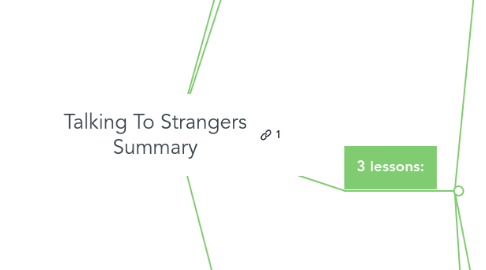
1. 1-Sentence-Summary:
1.1. Talking To Strangers helps you better understand and accurately judge the people you don’t know while staying patient and tolerant with others.
2. Favorite quote from the author:
2.1. "Sometime the best conversations with strangers allow the stranger to remain a stranger." - Malcolm Gladwell
3. 3 lessons:
3.1. You are overestimating your ability to read what people are thinking or feeling.
3.1.1. Against artificial intelligence, judges did worse at assessing people that the computers.
3.1.2. In a 2017 study, one Harvard economist fed his program the same information the judges got before making their decisions.
3.1.3. The defendants that the judges gave bail were 25% more likely to go out and commit another crime than those the computer would have chosen.
3.1.4. Back in 2001 a psychologist performed a study in which she had participants fill in missing letters for words, like “GL_ _.” Most people, when asked what their answers said about them, declared that what they wrote wasn’t an indication of how they were feeling.
3.1.5. But when the same group looked at answers that other participants shared, the story was different. They confidently declared, for example, that certain answers meant people were tired, or goal-oriented.
3.1.6. Even with a tiny amount of information we think that we can make a decision about someone. Yet we hold firm that we ourselves are more complex than that.
3.2. Humans naturally default to believing that others are telling the truth and are incapable of telling when someone is lying.
3.2.1. An example:
3.2.2. Our default is to believe people are telling the truth, assuming it until we have enough evidence that they are lying.
3.2.3. In a study by psychologist Tim Levine, participants were asked to tell who was lying in a mock scenario of people talking about a test they had taken. After multiple runs of the experiment, results continue to show that people can accurately determine a liar only 54% of the time.
3.2.4. Levine concludes that people need a clear trigger to tell if someone isn’t telling the truth. But even triggers might not work. Emotions aren’t expressed in the same way by everyone.
3.3. One reason you’re so bad at judging people is that everybody expresses their emotions and thoughts differently.
3.3.1. The idea that our disposition expresses how we feel is called transparency and is misleading.
3.3.2. In one study, scientists tried to surprise participants and asked what they thought their faces would show they felt. Although most people thought they looked surprised, only five percent had the “typical” wide-eyed and dropped jaws that we usually associate with surprise!
3.3.3. This works with other emotions as well.
